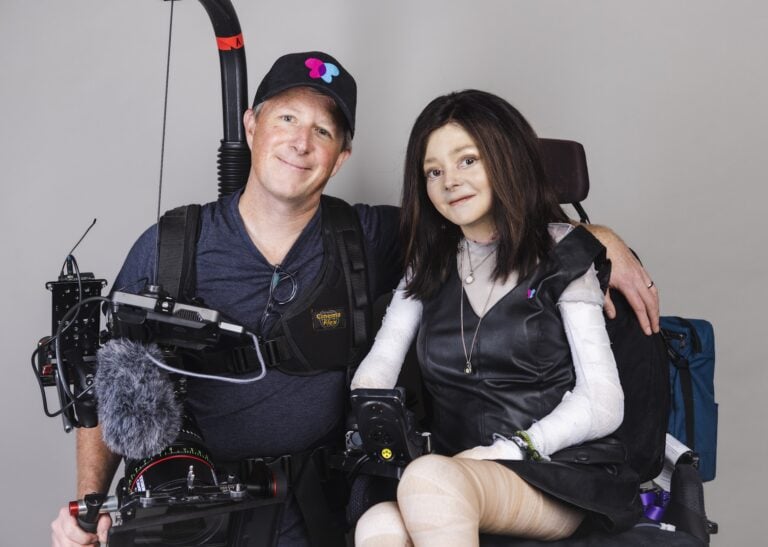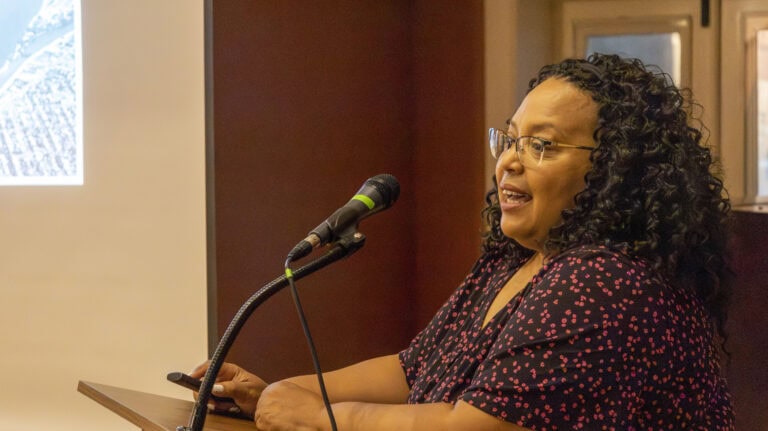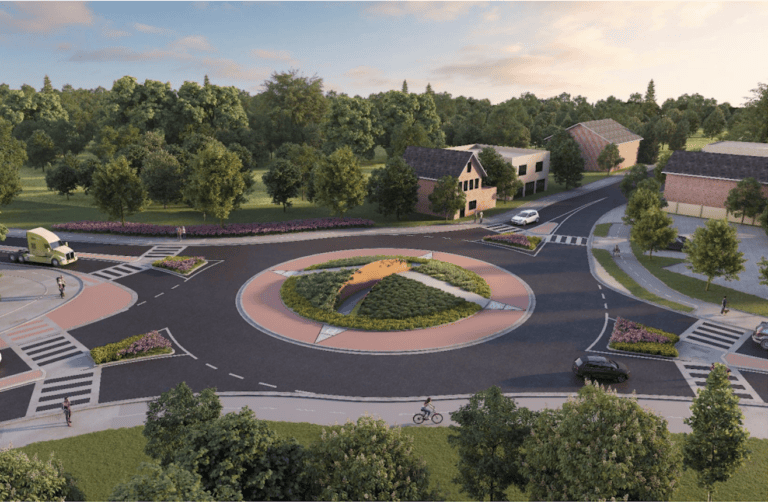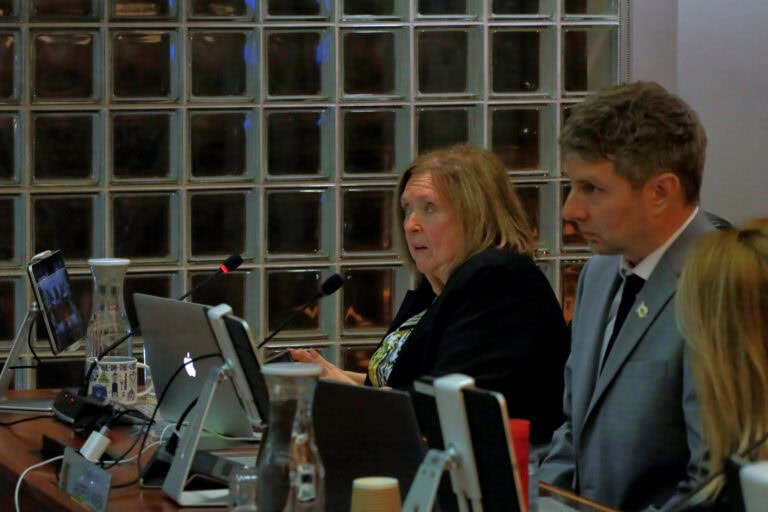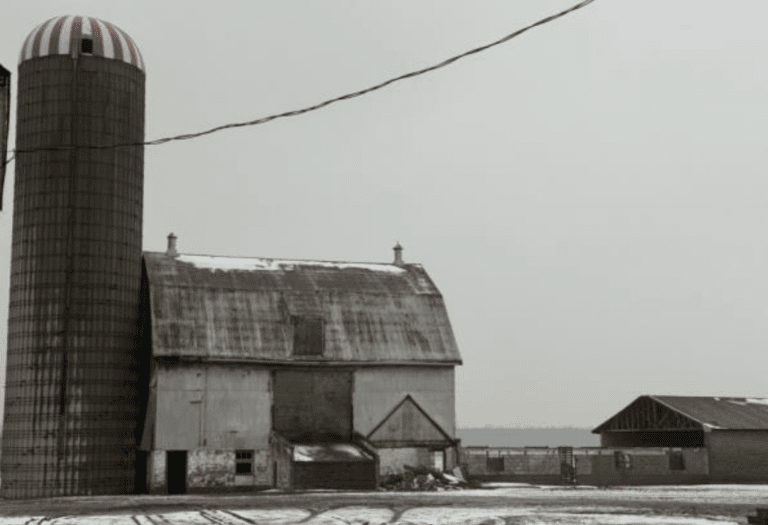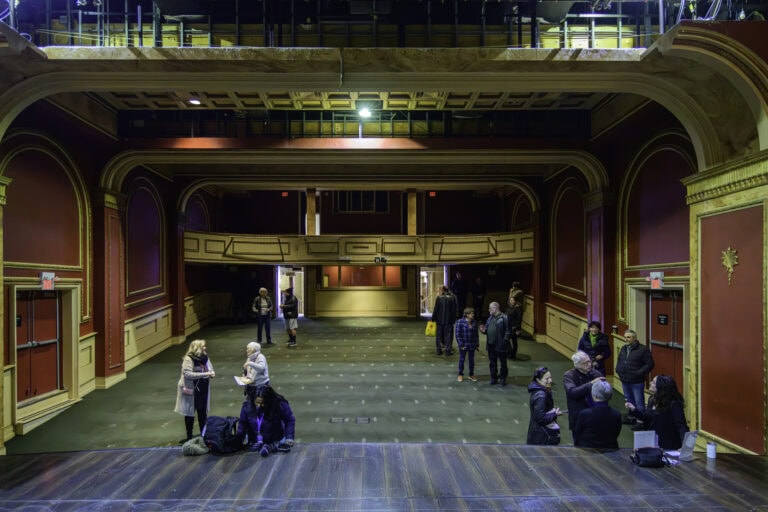Would a white person be willing to trade places with someone who is black?
That was a question posed to the crowd at an anti-racism rally in Niagara-on-the-Lake on Friday.
Not one white person raised their hand, making a clear point to the crowd: racism and prejudice is alive, everyone knows it and nobody else would want to experience it.
About 400 people, many from outside of NOTL, showed up to support the rally, during which two black women living in town spoke out about their own experiences with racism.
Yvonne Bredow, a Queenston resident, asked the tough question, and said she’d like every white person to give it some thought.
“You know what’s happening out there. You don’t want it for you. Why are you so willing to accept it for others and let it happen? That is your food for thought,” she said.
She said in her experience she feels racism regularly.
“My days consist of ‘What are you? How do you get your perm so tight? Can I touch your hair? Are you wearing contacts? You know, if you grew your hair longer and straightened it, you could pass for white.’ And the last one, ‘Why in the world would you tell anybody that you’re black? This is what I hear daily in different ways, forms and shapes,” she told the crowd.
She said she’s been called names and even fired from her place of work for speaking out against racism.
“These things leave scars on my heart — scars that don’t heal. Scars callous and they stay with you for a very long time,” she said.
“You do not refer to me as buckwheat. I’m not a coon, and I’m not the N word either. I am a person, I am me.”
She said she’s tired of hearing people say they can’t believe racism is happening.
“I’m really tired of hearing ‘I’m shocked. I can’t believe this. I had no idea,’ ” she said.
“Our pain is so off your radar that it shocks you. The news that keeps me up at night on any given day, not just now, has never really been a topic in your household, because it doesn’t affect you directly. It does because we are all human beings. We are all affected by this.”
“Some of the things I’ve experienced just in this town since living here — when people ask me if I do gardening, are you a housekeeper? It’s unbelievable.”
She said right now even she’s learning to put her foot down more.
“I’m going to start standing up when people are racist to me. I don’t say anything. I want the ground to swallow me up and make me disappear. You know why? Because if I say something, I’m going to hurt their feelings. That’s who I am. I’m worried about hurting someone else’s feelings when they are using racial remarks to me, saying something rude to me.”
People need to consider what they’re saying and how it might be offensive, she said.
“Think before you speak. A carpenter will measure twice and cut once. A good human being will think twice before they speak once,” she said.
“You turn us all inside out, we are all the same colour. We all bleed red.”
She said people need to use their voices to speak out against racism in their communities. “If you don’t say something you are condoning it.”
Jane Andres, founder of Niagara Workers Welcome, also spoke to the crowd. She said she spoke after a migrant worker declined to speak out of fear for his job.
Andres told the story of Solomon Moseby, a black slave who escaped to Canada from Kentucky.
Moseby was arrested and to be extradited back to the United States, “but the townspeople stood together and they decided it was morally wrong,” Andres said.
“For three days, they encircled the courthouse. For three days, white women joined their black sisters in the kitchen, cooking and caring for the people that formed the barricades in order to prevent Solomon from being taken away. The day that he was about to be extradited, everybody closed in and put a stop to the wagons. Two black men, one of them a school teacher, were killed by the local police,” she said.
Moseby ended up escaping and living a free life.
“These historic events which took place in Niagara-on-the-Lake paved the way for change. Niagara became a beacon of light for men and women trapped in the legal system of slavery,” Andres said.
Sue Batson Patterson, another black NOTLer, spoke about her experiences. She said she’s faced racism both in person and on NOTL’s community pages online.
“Nowhere is this cataloguing more evident than in the so-called local Niagara-on-the-Lake community groups that exist online. We all know what they are: ungoverned, useless repositories of exclusion, gaslighting, snobbery, rumour, tastelessness and hate. Not all of it. But enough,” she said.
She said soon after she moved to NOTL, she was the victim of a physical assault, about which police did nothing.
“The responding officer said, ‘You look like the kind of person who can take care of herself,’” she told the crowd.
“They went to the home of my attacker, there was no answer. And there was no further action taken.”
She said that’s not the sole experience she’s had.
“I want to be very clear, I have also had very positive, uplifting and supportive experiences with the local police. They’re not all bad. I do not hate police. The problem is, is that all of my interactions with the police were the result of others weaponizing them against me,” she said.
“I don’t have answers for the unholy hot mess the world is in right now … I had no intention of attending this rally. None — much less saying anything. But then I heard a rumour … that a local and venerable entertainment organization allegedly instructed people of colour and anyone who would listen not to come to this rally.”
She said she decided she needed to speak.
“I am here for my son. I am here for my husband and I am here for Yvonne.”
She said she encourages people to educate themselves about how they can be allies.
“I implore of all of you, Google how to be an ally, and let your work begin. That’s it.”
Patterson also praised the late Wilma Morrison for her contributions to black rights.
“I want everybody to just take a quick moment to remember Wilma Morrison. She was a treasure. We were so honoured to have her in our community,” she said.
“I know that she would be here and she would be marching with us.”
Nadia McDonald, a black Niagara Falls resident who attended, said to her the movement is about “accountability.”
“If someone does a crime, they should be held accountable and there should be justice no matter what your race, religion, identification, sexuality — we just want accountability.”
Eden Noble, 10, held a sign that read, “Don’t I matter?”
“Everyone should be treated the same and this needs to stop,” she said.
Rebecca Saylor, a white woman who was there as an ally with Nadia and Eden, said she came to stand up for her friends.
“Nadia has been my best friend since we were nine and so, (I’m) really just here as an ally to stand up, and to say, like Eden’s sign — ‘Don’t I matter?’ — Yeah, you do matter. Your lives matter. We see you, you have value. And we need justice.”
Juliet Dunn of the TD Niagara Jazz Festival said it was nice to see how many people showed up.
“It’s very powerful,” she said. “This is almost my community. I live in south St. Catharines, just across, but I do a lot in this community. And it really meant a lot to see so many people show up.”
She said while her experience in town has been different, she said it’s important for people to talk about racism.
“I think it’s great that this was organized, I think it’s very necessary. I haven’t had a lot of these experiences that people in the South have had and some of the people here that live in this town,” she said.
“I haven’t had to my face, anyway, which is one of the reasons I didn’t get up to speak today, because I didn’t feel I could speak to that. But I think it’s very important that people do know that these things do happen right here in our own backyard, and that people are aware. And so I was happy to hear the speakers talk about that.”
Jasmine, a black St. Catharines resident, who declined to give her last name, said it was nice to see white people being supportive.
“We had somebody chanting ‘all lives matter’ beside us, and to have a white woman step up and say something so that I didn’t have to meant a lot. So, I think just to hear and see the support is important. I’m just hoping people actually go home and do their homework.”
Her friend Tyrell MacLennan echoed similar comments.
“It’s nice to see everyone out here standing in solidarity with all the victims of police brutality and to fight for such a social injustice,” he said.
“Growing up in Niagara, you don’t always experience racism as blatantly as you see in the States or in other areas. But it’s still here, it still exists. And it’s important that people are educated on the topic, and so that we can make a difference and make change.”
While he appreciated the rally, he said there’s still a lot of work to do.
“Coming out here and protesting is a good start, but there’s a long road ahead of us in terms of change and making a difference and for the future, for us, for the black community of our future kids.”
He said he thinks more black history should be taught in schools.
“I was never taught in school that Harriet Tubman lived in St. Catharines for over 10 years. It’s just misinformation, miseducation. And that’s where I think all of the racism, or subtle racism, stems from, is miseducation.”





